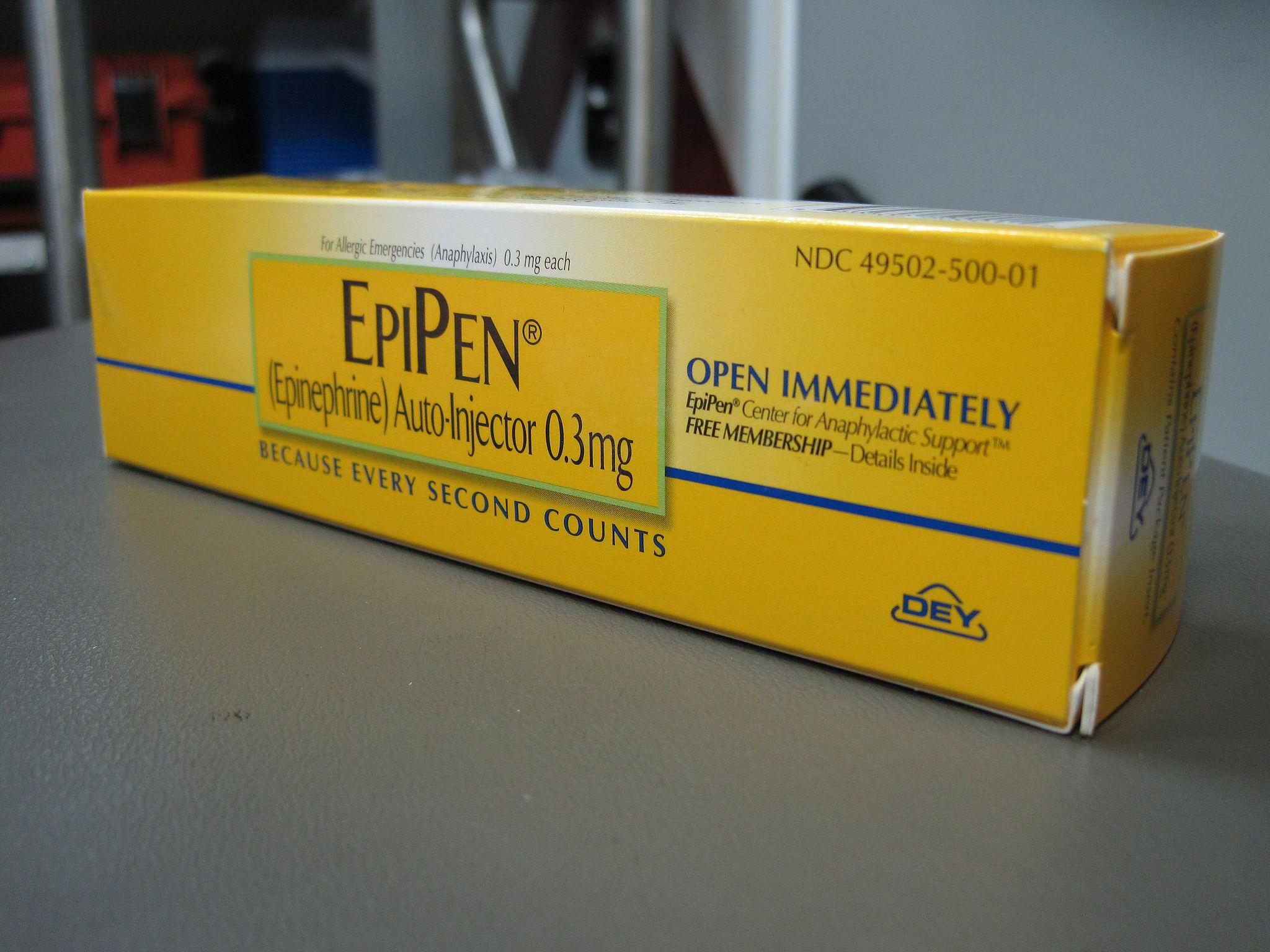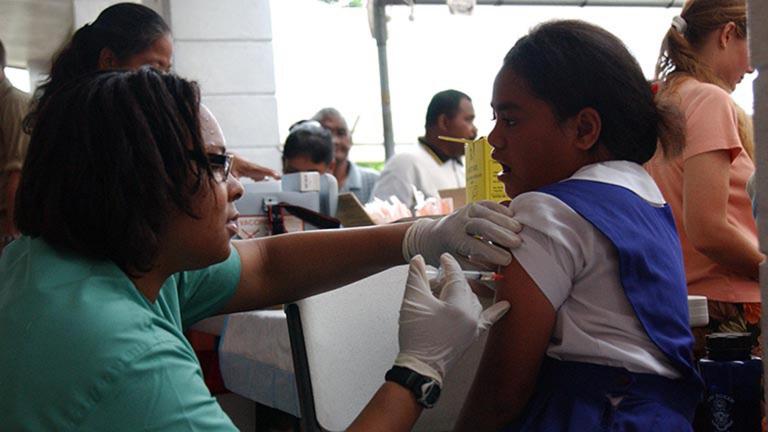 The EpiPen is an epinephrine auto-injector used to treat an anaphylactic allergic reaction, which can be fatal if not treated as soon as possible, according to Dr. Sarah Boudreau-Romano, attending physician at Ann & Robert H. Lurie Children’s Hospital of Chicago in the division of allergy and immunology.
The EpiPen is an epinephrine auto-injector used to treat an anaphylactic allergic reaction, which can be fatal if not treated as soon as possible, according to Dr. Sarah Boudreau-Romano, attending physician at Ann & Robert H. Lurie Children’s Hospital of Chicago in the division of allergy and immunology.
Mylan, the maker of the EpiPen, announced Monday it will create a generic version of its life-saving drug to treat severe allergic reactions. The announcement comes amid public outcry over the increasingly high cost of the EpiPen, which has gone from a cost of $100 in 2008 to $608 in 2016.
The generic version will cost $300 for a two-pack carton and should be available in several weeks. According to a company press release, it will be “identical to the branded product, including device functionality and drug formulation.”
The EpiPen is an epinephrine auto-injector used to treat an anaphylactic allergic reaction, symptoms of which include difficulty breathing, swelling in the throat and mouth, low blood pressure and dizziness.
“If someone is having an anaphylactic reaction, receiving epinephrine as soon as possible is the most important thing. If you look at data from food allergy fatalities, the biggest issue is delayed administration of epinephrine,” said Dr. Sarah Boudreau-Romano, attending physician at Ann & Robert H. Lurie Children’s Hospital of Chicago in the division of allergy and immunology.
Boudreau-Romano is skeptical about how much financial relief the generic version would provide, given the still-significant cost. “I’ll believe it when I see it and how it affects people,” she said, adding Mylan’s savings program doesn’t consistently help decrease the cost of the EpiPen for those who need it.
“In my opinion, Mylan needs to decrease the price instead of offering coupons that may or may not help.”
![]()
“I worried about exactly what is happening: People aren’t being protected because they aren’t carrying an EpiPen.”
–Dr. Sarah Boudreau-Romano
As a mother of four children—three of whom have food allergies—Boudreau-Romano says she’s worried about the increasing costs even though her insurance “covers a lot.”
“In seeing prices escalating over the years, that’s always worried me,” she said. “I worried about exactly what is happening: People aren’t being protected because they aren’t carrying an EpiPen.”
The rising cost of EpiPens has led to people “making decisions about their care that’s not recommended or the best thing to do,” Boudreau-Romano said.
“Because of the pricing, people are separating their two packs: one [EpiPen] at home and one at school,” she added. “Some can’t afford any and they’re depending solely on the schools’ undesignated EpiPens.”
Others have turned to do-it-yourself kits, which requires that they measure their own dosage via syringes. “I’ve seen a lot of talk on the internet about what you can do at home for $10,” Boudreau-Romano said. “The difficulty is when you get nervous, and it’s anxiety provoking to draw up your own dose, especially for nonmedical personnel.”
The time it takes to accurately measure out the correct dosage one needs could delay treatment, but it's better than nothing, said Boudreau-Romano. “EpiPens have an easier delivery system and that’s what makes people use it.”
However, Boudreau-Romano is supportive of legislation recently signed into law by Gov. Bruce Rauner that allows emergency medical technicians (EMTs) to employ the do-it-yourself approach.
“For medically trained people, I think that’s an acceptable way to do it,” she said. “They have the training and they’re not afraid to put a needle in somebody.”
Illinois Sen. Chapin Rose (R-Mahomet) sponsored the legislation after learning how much a local fire protection district could save if it were allowed to dispense epinephrine using a syringe rather than purchasing EpiPens.
 A recently signed law by Gov. Bruce Rauner allows emergency medical technicians to dispense epinephrine using a syringe instead of buying epinephrine auto-injectors like EpiPen. (Biggishben~commonswiki via Wikimedia Commons)
A recently signed law by Gov. Bruce Rauner allows emergency medical technicians to dispense epinephrine using a syringe instead of buying epinephrine auto-injectors like EpiPen. (Biggishben~commonswiki via Wikimedia Commons)
“This common-sense proposal is just another tool our emergency responders can utilize to save lives,” Rose said in a statement. “It will also save our rural communities a lot of money as vials are less expensive than epinephrine auto-injectors. Additionally, epinephrine auto-injectors have a shorter shelf life, so many times, they have to be disposed of without ever even being used.”
The high cost of EpiPens has also led to some people hanging on to expired EpiPens instead of disposing of them. While an expired EpiPen may work, Boudreau-Romano cautions against relying on it.
“There’s probably some percentage of epinephrine still available but there’s no guarantee. … There’s not a meter that says how much potency is left. You don’t know if it will have enough of a dose to save a life,” Boudreau-Romano said.
“People are getting fewer than they ideally need and they are left unarmed at home or they’re separating their two pack,” she added. “It’s so important to have the two together. For example, if you’re a parent and you’re trying to administer an EpiPen to an infant and the baby moves at the last second and you get the medication out, you’re out. You don’t get the treatment.”
With many unable to afford to the medication, it further underscores the need for first responders to have access to it.
“We are trying to get epinephrine in the hands of all first responders,” Boudreau-Romano said. She helped advocate for the passage of the Annie LeGere law which allows for law enforcement personnel to carry and administer EpiPens. “So many people don’t realize they’re having an allergic reaction.”
Annie LeGere was 13 when she died as a result of an anaphylactic shock from an unknown allergic reaction. Police were the first to arrive on the scene on but were unable to help because they were not allowed to carry and administer EpiPens.
State Sen. Chris Nybo (R-Elmhurst) worked closely with Shelly LeGere, Annie’s mother, to pass the legislation.
“There is a saying about turning tragedy into triumph. … Last August, 13-year-old Annie LeGere suffered a very severe allergic reaction and unfortunately, epinephrine was not available to be administered to save her life,” Nybo said in a statement. “A portion of the bill we passed today is going to be known as the Annie LeGere Law. Our hope… is that we are going to save some lives and hope this situation never happens again. This is a step forward.”
This past Saturday, LeGere’s family, Nybo and other lawmakers, along with Annie’s friends dedicated a tree and bench in her honor at Sandburg Middle School in Elmhurst to commemorate the one-year anniversary of her death.
Follow Kristen Thometz on Twitter: @kristenthometz
Related stories:
 New State Law Regulates Health Insurers’ Prescription Drug Policies
New State Law Regulates Health Insurers’ Prescription Drug Policies
Aug. 16: New health insurance rules surrounding prescription drugs could make treatment for some patients more simple. Find out what step therapy is and what the changes could mean.
 Officials Remind Families to Get Vaccines in Order Before New School Year
Officials Remind Families to Get Vaccines in Order Before New School Year
Aug. 15: Parents and guardians are encouraged to get their children up to date on their immunizations soon or face a possible school suspension.
 13-Year-Old with Nut Allergies Creates a Documentary
13-Year-Old with Nut Allergies Creates a Documentary
April 13, 2015: Jack Yonover is one of an increasing number of kids who have to watch what they eat to avoid potentially life-threatening nuts. The Wilmette teen has created a documentary about the dangers of nut allergies from a kid's perspective.



